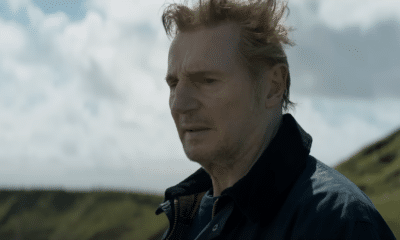Monos review: Children of Men – Alejandro Landes’ latest is a breathtaking bandit of a film that notes just how perilous innocence is.

Monos may just have as firm a grasp on this humanity schtick as possible. Philosophically constructive and emotionally devastating, Landes and fellow screenwriter Alexis Dos Santos paint a haunting portrait of humanity’s basest qualities; a longing for closeness, a fear of death, and a wild propensity to unintentionally bring both upon us.
This is not the first war drama to hone in on the legacy that violence leaves in the lives of children. Mono’s fresh-faced, stricken-eyed cast bring to mind Cary Fukunaga’s Beasts of No Nation.
But Monos — named after its titular crew of child soldiers — is a curveball, hitting nerves an audience may be surprised to learn they even had. The focal lines are blurred between eight adolescent guerrillas and their prisoner — to the point where we ache for their escape in equal measure to the POW American Medic, Sara, who they watch over.
At first, all play nice.
Jasper Wolf’s spectral cinematography is a trump card and a reminder of the impact the big screen can have when utilised this way — the coldest, harshest circumstance are set with luminous beauty. Through the rolling clouds, in a mountaintop kingdom of their own, eight (barely post-pubescent) soldiers live. Their existence, riddled by wrestling and campfire bickering, and bookended by excruciating training regimes, has a perverse domesticity to it. They play a charming, bumbling version of the society they’ve been barred from by duty. In the first act, they strive for romance, (group favourites ‘Lady’ and ‘Wolf’ are built a log bed and fall into marriage) tradition, (gentle ‘Rambo’’s birthday ushers in a ceremonial belt-whipping and singsong) and play with their guns with the quick-fingered indifference of lego.
Even their constant companion and purpose — captive US civilian ‘Doctora’ (no one calls her Sara except the western news anchors) is treated more like a pal: the girls perch on the rocks behind her and braid her hair.
Heady sequences of sex and drugs even flare up — brazen but unsensational — and really quite sadly, desperately bereft of meaning without a lawful society to make it count.
But of course, it’s a war. And when the mounting unease finally breaches the uncanny calm of this little settlement, it does so hard and horrible. When a drunken accident mean Monos fail at the simplest factor of their existence (proving their loyalty by safe-guarding the Rebellion’s milk-cow) the whole straw tower of function falls apart like the fallacy it always was. Now, to avoid the firing squad, they must flee — Doctora in tow — deeper, downriver, into darkness.
A roughly 100 minute run-time feels shorter and lingers long after. At a faultless pace, chaos breeds more chaos: breakups, breakaways, broken bones, trust, and breakdowns of bonds within the gang and between they and their captive.
The sweeping, documentary precision of the filmmaking means it works as a literal depiction of civil violence. The camera creeps over jungle-leaves and over war-paint caked skin with a rivetingly clear eye, and the sound of bullets is so present you can feel it in your teeth.
But it’s also whimsical. There’s a sequence of events but their formation is muddled and vibrant like a bad trip. Meanwhile, Mica Levi’s score — a sweet, synthetic whistle warped ever deeper — shades just over a quarter of the overall film, capturing the spirit of a childhood game, lost somewhere far-away.
The whole cast are a tremendous source of the lyrical element. All are equally rich, different character studies, but their one jarring similarity (terror — at their adult superiors, each other, and themselves) keeps stock that they’re just kids.
Moses Arias is at a career best in the closest thing to an antagonist — cult boy-leader Bigfoot. Sofia Buenaventura (‘Crybaby’ Rambo) and Juliane Nicholsan (also with her most stunning, and dark performance yet as the captive Doctora) are given the most fascinating arc with the most gut wrenching implications as two sides of the same coin. Their primal rejection of the violence that permeates the stinking, sweltering air — even as they give in to it themselves — leaves much to think about. To watch Rambo weep at chaining her up to a tree is to see who is actually bound: the one dragged, kicked and screaming, into war from their privileged position of peace, or the one born into it — politicised by sheer bad luck, an imperfect puppet of the very thing that destroys them.
Even at its most profound Monos is generous, darkly funny and blockbuster league watchable; grounded by intimate tragedy and elevated by unforgettable big-screen spectacle. The physical immensity of Sandes’ set pieces (sheer cliff drops and rising rivers) may even top the scale J.A Bayona captured seven years ago with The Impossible’s tsunami. It recalls too, Denis Villeneuve’s Sicario: keeping the acts of murder and cruelty fixed to the outskirts of the frame until —after unbearable, hair-raising episodes of intense waiting — it happens right there, looking you right in the eye. When the deaths did come, we were — all of us — shivering and dazed in its wake, uncomfortably aware that we, unable to take the anticipation any longer, had all, for a dark second, asked for it.
Monos is a revelatory, electrifying experience that will leave you desperate for peace, asking for the bleak end. Perhaps that’s what the makers are saying about us all. Film rarely gets harsher, or better than this.
Monos is released in cinemas on 25th October.

Latest Posts
-


Home Entertainment
/ 8 hours ago‘The Iron Claw’ physical home release set
Zac Efron, Jeremy Allen White, Harris Dickinson, Maura Tierney, Stanley Simons, Holt McCallany and...
By Paul Heath -


Film News
/ 9 hours agoEmily Booth to star in ‘Electric Meat’ and appear at HorrorConUK
Emily Booth, one of the UK’s iconic women of horror, has joined forces with...
By Kat Hughes -


Film News
/ 10 hours agoKristen Stewart and Oscar Isaac will play vampires in ‘Flesh of the Gods’
According to an official press release, Kristen Stewart and Oscar Isaac will star in Mandy...
By Paul Heath -


Film News
/ 10 hours agoNew ‘Exorcist’ movie on the way with Mike Flanagan in talks to direct
Mike Flanagan is reportedly in talks to direct a new version of The Exorcist....
By Paul Heath













